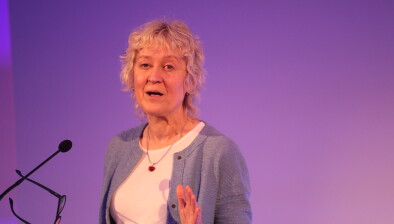Holyrood committee concludes housing inquiry with call for urgent action plan

Committee convener Ariane Burgess MSP
A national action plan must be developed to tackle the housing emergency to avoid the risk that the crisis “drifts on indefinitely”, according to a new report published today by a Scottish Parliament committee.
A year on from the official declaration of the national housing emergency by the Scottish Parliament, the Local Government, Housing and Planning Committee said a Housing Emergency Action Plan with clear milestones and outcomes would ensure progress towards ending the crisis can be properly assessed.
It is one of ten recommendations for the Scottish Government made in the Committee’s Housing Inquiry Report.
Other recommendations include that the Scottish Government should, as a matter of urgency, complete and implement its review of the affordable housing target (due summer 2024), provide an update on what progress has been made, and what the revised timescales are for completion.
According to the report, the government should also provide clarity on whether its additional funding for the Affordable Housing Supply Programme budget will ensure that it meets its target of providing 110,000 affordable homes by 2030, and explore further the opportunities presented by increasing social investment in housing and in developing the capacity of the non-profit sector to obtain private finance.
The Committee launched its inquiry last year, hearing from professionals working in the housing industry, local authorities, academics, homeless charities, tenants and landlords.
Local Government, Housing and Planning Committee convener, Ariane Burgess MSP, said: “It’s now a year since the Scottish Parliament officially declared a national housing emergency and homelessness remains dangerously high in some areas where there is now a systemic failure in the ability of local authorities to meet their statutory duties.
“During this Inquiry, we heard that the housing emergency was years, even decades, in the making and was therefore both predictable and preventable.
“We can’t afford to be complacent. The Scottish Government must work with the wider housing sector to take urgent collective action to address the emergency and ensure all its departments and policies are having a measurable, clear and positive impact.”
The Committee also took evidence from housing minister Paul McLennan, including on the Scottish Government’s Housing 2040 strategy, and is calling for an implementation plan of that policy to be developed as a matter of urgency. It also made a further recommendation that housing providers are given urgent clarity on the intended legal requirements for homes to meet net zero standards.
Business as usual ‘not enough’
A year on from the declaration of a housing emergency, the Scottish Federation of Housing Associations (SFHA) has released its latest policy paper, as part of a wider series, to address the urgent need for housing ahead of the next Holyrood elections.
Focusing on ‘Maintaining Tenancies and Preventing Homelessness’, the report explores how housing associations help tenants to stay healthily and happily in their homes and reduce waitlist pressures and calls on the next Scottish Government to recognise this role.
Actions SFHA wants to see include:
- Long-term tenancy sustainment support for housing associations, to fund activities that prevent people becoming homeless
- A new Scottish ‘last resort’ grant fund
- A review of funding for housing support
- Robust and properly funded mental health services
The report also highlights the growing complexity of tenants’ needs, particularly in relation to mental health support. Housing associations are increasingly concerned that a lack of adequate support is contributing to longer wait times and risks of tenancy failure.
Poor mental health can lead to difficulties in managing a tenancy. This may result in repeat homelessness and growing waitlists, for example, or in damage or deterioration of the property that delays the re-let process and increases pressure on housing supply.
Annabel Pidgeon, policy lead at SFHA, said: “Scotland is facing a housing and homelessness emergency that demands clarity and joined up action between our sector and the Scottish Government. This report provides policymakers with a snapshot of the challenges and makes recommendations for enabling housing associations to continue to help people remain in their homes, avoid homelessness and thrive.
“Housing associations are working tirelessly to support tenants, but without the right investment and a long-term view, the system is under unsustainable pressure. If we want to prevent homelessness rather than just respond to it, we must prioritise support services and give our housing sector the confidence to meet diverse needs and plan for the future.”
New research released by Shelter Scotland to mark the anniversary has found that more than four in 10 adults in Scotland are now impacted by the housing emergency (42%), an increase of 800,000 in just four years (up six percentage points from 36% in 2021).
A new poll conducted by YouGov found that 2.3 million adults in Scotland (42&) are struggling with the condition, security, suitability or affordability of their home, or have faced discrimination while trying to find one.
Shelter Scotland warned that political leaders have so far failed to deliver meaningful solutions to address the worsening housing emergency. As it launches its new strategy, Shelter Scotland is setting the goal of making next year’s Scottish election an election to end the housing emergency. The charity is calling on every voter in Scotland to join the fight for home and demand that politicians of all parties focus on building enough homes.
Shelter Scotland director Alison Watson said: “It’s been a year since the Scottish Parliament declared a housing emergency. Since then, homelessness has gone up and social housebuilding has gone down.
“Last week the Scottish Government announced a Programme for Government with no plan to end the housing emergency. Instead, we had a Programme for Homelessness which says nothing about the 10,360 children are trapped in temporary accommodation which experts say exposes them to violence, vermin and isolation. This simply cannot continue into the next government.
“Everyone deserves a safe, secure home. But too many people in Scotland still live in fear — battling unaffordable rents, unsuitable housing, or outright discrimination. Today’s research reveals the harsh toll Scotland’s housing emergency has taken over the last four years – and it’s only getting worse.”
Ms Watson added: “We want people to arm themselves with the knowledge of their housing rights. Scotland has some of the strongest housing legislation, but local authorities and the government need to comply to the law.
“This continued harm cannot be the norm. It’s time to say: enough is enough. The Scottish Government must urgently publish an updated housing emergency action plan. We need more social homes so the hundreds of thousands of people in Scotland no longer have to compromise their health, safety and education.”
Sector body Homes for Scotland (HFS) has called on the Scottish Government to urgently implement the radical intervention required to tackle the escalating housing emergency.
Jane Wood, HFS chief executive, said: “Today now marks a year since the Scottish Parliament declared a national housing emergency. Twelve months on and we are still nowhere near addressing the scale of this challenge. Indeed, we don’t even have an official exit strategy or metric from the Scottish Government to tell us when the emergency might be over.
“This simply isn’t acceptable. We require more than what can only be described as a business-as-usual response from the Scottish Government which regularly cites arbitrary comparisons regarding housing delivery with other parts of the UK rather than acknowledge the 693,000 Scottish households currently living in housing need. The reality of the situation in Scotland is stark and it demands an emergency response.
“Over the last twelve months, we have seen homelessness reach another record high with over 16,500 households (including more than 10,000 children) in temporary accommodation, and housing starts and completions across all sectors continue to fall across consecutive years.
“Indeed, the significance of the housing challenge facing Scotland and need for bold and radical leadership to tackle this is now being amplified across business and academia. Over the last number of weeks we have seen the David Hume Institute, Prosper and the CBI clearly call for a rethinking of housing policy to grow the economy and protect the social wellbeing of the people of Scotland.
“Issuing a clear call to deliver an all-tenure target of at least 25,000 new homes each year in Scotland would give clear strategic direction and intent between national and local policymakers to prioritise new housing delivery. Returning to pre-recession levels of home building in Scotland would generate £3.7bn in total economic output to the Scottish economy and support 87,000 high quality jobs each year.”
Ruth Gilbert, national campaigns chair of Living Rent, added: “This government’s record since they declared a housing emergency is nothing short of abysmal.
“Over the last year, it has backtracked on promises, undermined its own policies and completely failed to grasp the magnitude of the crisis
“Across Scotland, tens of thousands are stuck in unaffordable housing, homes with disrepair, in temporary accommodation or have become homeless.
“The money the government has committed to affordable housing won’t even begin to dent this. They need to be investing billions not millions.
“Their plan to introduce exemptions and water down the housing bill is now threatening the one piece of legislation that would benefit tenants. The direction of travel is straight into a wall, with thousands as collateral damage.
“Enough is enough, this government needs to take the housing emergency seriously and invest significantly in building social homes. How much worse does it need to get before the government takes action?”
Increasing supply and reducing temporary accommodation use
Since the declaration, the Scottish Government said it has taken a range of measures to increase investment in housebuilding and help reduce the number of households in temporary accommodation.
It highlighted actions taken in the last year, which include:
- Investing £600 million in affordable housing in 2024/25. £40m of which was used to purchase properties and bring empty social homes back into use.
- Helping to reduce the number of households in temporary accommodation in 12 council areas, according to the latest figures.
- Making an additional £1m available to Registered Social Landlords and third sector organisations to prevent homelessness and support people to stay in rented accommodation.
- Boosting supply through other funding models, including the Charitable Bonds programme which has seen investment of £46m in the past year, supporting the delivery of 325 homes.
Social justice secretary Shirley-Anne Somerville said further action will be taken in the coming year to continue to tackle the housing emergency and ensure more people can access a safe and affordable home.
The Scottish Government plans to invest £768m in this financial year in affordable housing, which will support the delivery of 8,000 homes for social and mid-market rent and low-cost home ownership. It will also provide local authorities with £15 billion this financial year for a range of services, including homelessness services, while £2m will be invested through the Scottish Empty Homes Partnership to continue to reduce the number of privately owned empty homes.
Ms Somerville added: “Providing everyone in Scotland the right to a warm, safe and affordable home is essential to our key priority of eradicating child poverty. The measures we have taken have meant increased investment in the affordable housing sector and fewer families living in temporary accommodation.
“As a result of our actions, an estimated more than 2,600 households with children have been helped into affordable housing in the year up to December 2024.
“We have delivered 136,000 affordable homes, with 97,000 of those for social rent, between 2007 and the end of December 2024. We are also working to identify and turn around empty private and social homes and encouraging more funding streams into the sector through our Housing Investment Taskforce.
“It is encouraging that we are seeing a reduction in families in temporary accommodation in some local authority areas. However, we know there is more to do which is why we have increased the affordable housing budget for this financial year by £200m to £768m. In the longer term, we will also introduce homelessness prevention measures and a system of long-term rent controls in our Housing Bill.
“We are determined to tackle the housing emergency and ensure that everyone in Scotland can have somewhere to call home.”
The Scottish Government is expected to respond to the Local Government, Housing and Planning Committee’s report within two months.








